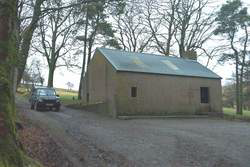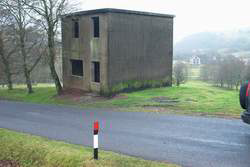Abandoned Communities ..... Mynydd Epynt
Similarly it appears that the local council, the Breconshire County Council, quickly bowed to what they took to be inevitable. It may have been true that the War Office had the authority to take over Mynydd Epynt without consulting the County Council, but even so it is likely that there would have been scope for the Council to make much stronger representations against the proposals.
The local press, both in the Breconshire area and more widely in South Wales, failed to offer any real support for the people of Epynt. The Western Mail and the Brecon and Radnor Express were English language newspapers often assumed to be unsympathetic to the needs and culture of Welsh language communities. They reported on a number of relevant meetings, and also on what happened when a deputation went to London to protest to the War Office, an event to which I shall return in a moment. But they did not provide the sort of editorial indignation that might have led to more effective opposition to the evictions.
Welsh language newspapers were much more outspoken. Rev J Dyfnallt Owen referred in Y Tyst on 14 March to the intention to appropriate "one of the most romantic regions of Wales" and invited readers to "consider the odiousness of the crime simply from an economic viewpoint". He continues: "On the one hand the Government blusters about improving the land, about rearing animals, or breeding sheep, and in the same breath a part of the country which produces these essentials is vandalised". And then: "The despoliation means uprooting a part of our nation which has been here for generations. They will be exiled from their lands and homes".
After visiting some of the farmers J Dyfnallt Owen wrote again "We saw tears flowing down the healthy cheeks of the hill farmers as we discussed with them the unholy wrong done to them. We chatted with some whose forebears had lived on the same farm for three hundred to four hundred years. The melodious Breconshire dialect remains like music on their lips. But between the fear they entertain for their future, the lack of clear, strong leadership, and the temptation to strike a bargain in the face of the iron fist of militarism, there is a great danger that Wales will lose a tract of land which is an important defence against the English flood".
One organisation that expressed its view forcefully was the South Wales Association of the Presbyterian Church, the denomination that administered Babell chapel. At a meeting in Swansea on 3 April it passed a motion deploring "the depopulating of such a vast area, the ruin of its ancient homes, the economic loss to an industrious people and the dispersal of a community which has dwelt there from time immemorial, the closing of its sanctuaries and the inevitable destruction of its distinctive culture". The motion was sent to the Ministry of Agriculture in the form of a telegram, and it was followed up by a meeting in London between members of the Presbyterian Church and Lord Cobham, Assistant Secretary of State for War. Lord Cobham expressed sympathy but made it clear that it was too late to reverse the decision.
The only organisation that mounted a sustained protest was the Committee for the Defence of Welsh Culture, which included representation from the Welsh Nationalist Party, the party which later became Plaid Cymru. Frequent meetings were held, petitions were organised, and members of the Committee worked hard to offer support to the people of Epynt and encourage them to resist the evictions. During the first two weeks in April, for example, J E Jones, General Secretary of the Welsh Nationalist Party, visited all the farms under threat. He wrote that at that time only nine farmers had found alternative accommodation, and "they would have preferred to stay. No one wants to move, not one family". He described visits to three homes where women in their eighties were living. They told him: "If we could only move together to one locality we wouldn't complain so much, but to be thrown out amidst strangers - some families having to live amongst Englishmen even - it is terrible".
At a meeting on 10 March the Committee for the Defence of Welsh Culture reported that they had sent a telegram of protest to the Prime Minister, Neville Chamberlain. They urged that a deputation should be sent to meet the Prime Minister, or if it could not be received by the Prime Minister, the Minister of Agriculture. This was agreed, and it was decided that the deputation should include Members of Parliament, representatives of Breconshire County Council, and representatives of the farmers, as well as senior members of the Committee for the Defence of Welsh Culture.
The local press, both in the Breconshire area and more widely in South Wales, failed to offer any real support for the people of Epynt. The Western Mail and the Brecon and Radnor Express were English language newspapers often assumed to be unsympathetic to the needs and culture of Welsh language communities. They reported on a number of relevant meetings, and also on what happened when a deputation went to London to protest to the War Office, an event to which I shall return in a moment. But they did not provide the sort of editorial indignation that might have led to more effective opposition to the evictions.
Welsh language newspapers were much more outspoken. Rev J Dyfnallt Owen referred in Y Tyst on 14 March to the intention to appropriate "one of the most romantic regions of Wales" and invited readers to "consider the odiousness of the crime simply from an economic viewpoint". He continues: "On the one hand the Government blusters about improving the land, about rearing animals, or breeding sheep, and in the same breath a part of the country which produces these essentials is vandalised". And then: "The despoliation means uprooting a part of our nation which has been here for generations. They will be exiled from their lands and homes".
After visiting some of the farmers J Dyfnallt Owen wrote again "We saw tears flowing down the healthy cheeks of the hill farmers as we discussed with them the unholy wrong done to them. We chatted with some whose forebears had lived on the same farm for three hundred to four hundred years. The melodious Breconshire dialect remains like music on their lips. But between the fear they entertain for their future, the lack of clear, strong leadership, and the temptation to strike a bargain in the face of the iron fist of militarism, there is a great danger that Wales will lose a tract of land which is an important defence against the English flood".
One organisation that expressed its view forcefully was the South Wales Association of the Presbyterian Church, the denomination that administered Babell chapel. At a meeting in Swansea on 3 April it passed a motion deploring "the depopulating of such a vast area, the ruin of its ancient homes, the economic loss to an industrious people and the dispersal of a community which has dwelt there from time immemorial, the closing of its sanctuaries and the inevitable destruction of its distinctive culture". The motion was sent to the Ministry of Agriculture in the form of a telegram, and it was followed up by a meeting in London between members of the Presbyterian Church and Lord Cobham, Assistant Secretary of State for War. Lord Cobham expressed sympathy but made it clear that it was too late to reverse the decision.
The only organisation that mounted a sustained protest was the Committee for the Defence of Welsh Culture, which included representation from the Welsh Nationalist Party, the party which later became Plaid Cymru. Frequent meetings were held, petitions were organised, and members of the Committee worked hard to offer support to the people of Epynt and encourage them to resist the evictions. During the first two weeks in April, for example, J E Jones, General Secretary of the Welsh Nationalist Party, visited all the farms under threat. He wrote that at that time only nine farmers had found alternative accommodation, and "they would have preferred to stay. No one wants to move, not one family". He described visits to three homes where women in their eighties were living. They told him: "If we could only move together to one locality we wouldn't complain so much, but to be thrown out amidst strangers -
At a meeting on 10 March the Committee for the Defence of Welsh Culture reported that they had sent a telegram of protest to the Prime Minister, Neville Chamberlain. They urged that a deputation should be sent to meet the Prime Minister, or if it could not be received by the Prime Minister, the Minister of Agriculture. This was agreed, and it was decided that the deputation should include Members of Parliament, representatives of Breconshire County Council, and representatives of the farmers, as well as senior members of the Committee for the Defence of Welsh Culture.
Three
Cefnbrynisaf, in its original state the home of the Lewis family
A new building

